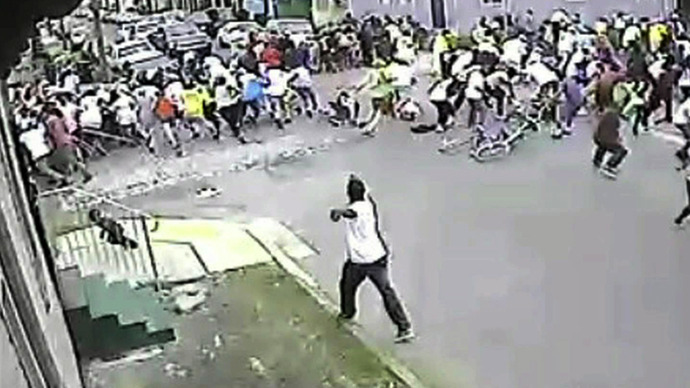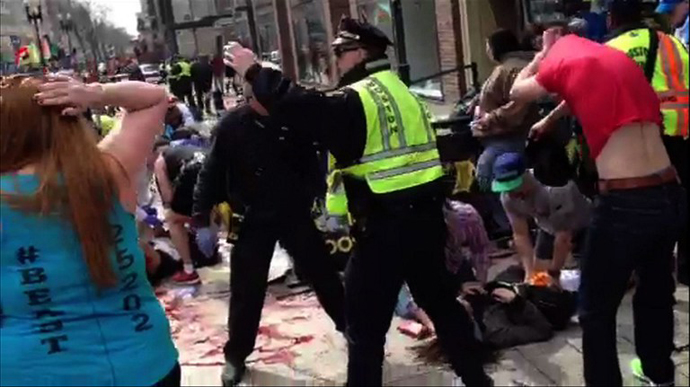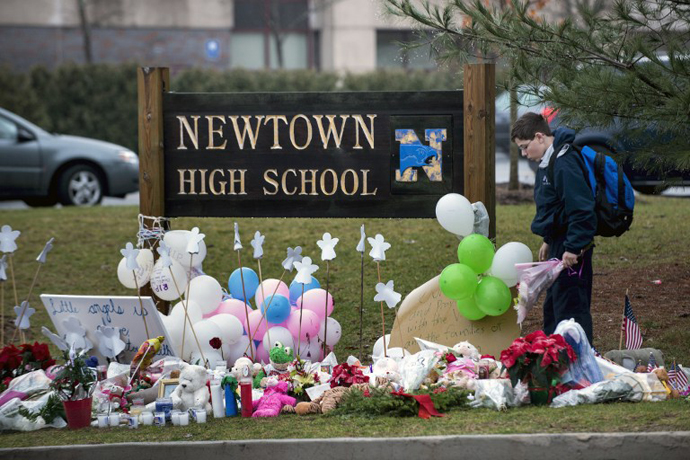Guns and terror making US an unsafe security state

As America confronts yet another senseless act of barbaric violence, what kinds of security measures will the country be willing to accept on behalf of safety?
On Sunday, during a Mother’s Day parade in New Orleans, at least two gunmen opened fire into the crowd, injuring 19 revelers.
What is going on here? How can it be that America seems to be getting more dangerous despite the raft of over-the-top security measures that have been put in place since 9/11? Could it be that the authorities are concentrating their efforts on the wrong people?
Prior to the Boston Marathon bombing of April 15, for example, which left 3 people dead and 264 wounded, Massachusetts state officials said they had never received intelligence information that Moscow had passed to the US about the mastermind of the attacks, Tamerlan Tsarnaev, a Chechen native who was said to have been motivated by extremist Islamic beliefs.
The FBI had previously opened a probe into Tsarnaev, but closed
the case without concluding he posed any threat — and without
warning Boston officials that a suspected radical extremist was
loose in their town.
Meanwhile, it has been proven that a Boston police counterterror intelligence unit spent a significant amount of time and money in 2011 using a US Department of Homeland Security-funded fusion center to conduct surveillance of specific protest groups, including Occupy Wall Street offshoots and anti-war demonstrators.
Boston Police Commissioner Ed Davis admitted to a congressional panel following the attacks that federal agents failed to warn his department of Tsarnaev. Davis told lawmakers “we would have liked to know” about the Russian tip-off.

In October, the American Civil Liberties Union in Massachusetts published documents confirming that the Boston Police Department spied on protesters and even relied on their local federally funded fusion centers to further their probe.
Lots of measures, little security
The American people were given their first taste of the security
state following the terror attacks of 9/11. Before the fires had
been extinguished from the site of the World Trade Center, former
President George W. Bush signed – opportunistically, many critics
say – the Patriot Act.
This massive document, which few members of Congress had
the time or desire to read, allows for roving wiretaps,
court-ordered searches of business records and library book
withdrawals, and surveillance of private citizens.
Washington continues to demonstrate with breathless audacity – in
the heat of an emergency when the country is still dusting itself
off – that the liberties and freedoms of the American people are
chimerical creations, leaves of paper that may blow away on the
wind with a mere nod of Caesar’s head.
Once a government starts down the slippery slope of enacting draconian security measures, it becomes exceedingly difficult to apply the brakes on the bandwagon. The addictive elixir of power is a dangerous substance that has been known to disturb the faculties of the wisest men.
In December 2011, Obama put his signature to yet another
explosive piece of legislation known as the 2012 National Defense
Authorization Act (NDAA). Among other things, this law codifies
indefinite military detention for American citizens – without
charge or trial – for the first time in US history.
According the American Civil Liberties Union, “The NDAA's dangerous detention provisions would authorize the president – and all future presidents – to order the military to pick up and indefinitely imprison people captured anywhere in the world, far from any battlefield.”
Since the Patriot Act and NDAA legislation have matured and grown teeth, so to speak, it is time for a brief inventory. First, as Sunday’s events in New Orleans proved, the country is no safer now than it was before these laws were passed.
Some of the more deadly events in America’s recent history include the shooting massacre at a movie cinema in Aurora, Colorado, which left 12 people dead and 58 wounded (July 20, 2012); the Sandy Hook Elementary School shooting, 26 dead, 20 of whom were children, and no report on the number of injured to date (Dec. 14, 2012).

These questions are bringing the United States on a collision
course with a nasty Catch-22: With each new tragedy, the
government moves to further curtail civil liberties in its quest
for public safety. However, a growing number of Americans are
becoming skeptical, even suspicious, of the new security
measures, especially when they so often work against innocent
civilians.
On this point, it cannot be ignored that an entire Internet
cottage industry is growing up around the conspiratorial idea
that many of the above tragedies were hatched by the government
as a means of eradicating civil rights, and, more importantly,
separating the American people from their cherished guns. The
right to bear arms, despite being protected by the Second
Amendment, appears to be headed for a government showdown.
Although Congress failed in its first round to limit gun rights, it seems that public opinion may eventually turn against gun rights advocates, despite the hallowedness of the Constitution and weighty lobbying power of the National Rifle Association.
The story, however, is not over. Although the White House has declared gun control a priority, it is certainly not practicing what it preaches.
In April, Representative Jason Chaffetz said that the Department of Homeland Security owns around 1,000 rounds of ammunition per person more than the US Army, as he and other lawmakers questioned DHS officials on their massive bullet purchases.
"It is entirely ... inexplicable why the Department of Homeland Security needs so much ammunition," Chaffetz said at a hearing
Chaffetz revealed that the DHS has more than 260 million rounds
of ammunition in stock. He noted the department bought more than
103 million rounds in 2012 and used 116 million that same year,
among roughly 70,000 agents. That’s a lot of target practice.
He said the DHS is blowing through between 1,300 and 1,600 rounds per officer, while the US Army goes through roughly 350 rounds per soldier in the same period.
While every state has a right and duty to protect its people as
it sees appropriate, more American people may start to suspect
that the real menace to their personal safety comes from the
government itself.
Robert Bridge is the author of the book, Midnight in the American Empire, which examines the dangerous consequences of extreme corporate power now prevalent in the US.
The statements, views and opinions expressed in this column are solely those of the author and do not necessarily represent those of RT.
The statements, views and opinions expressed in this column are solely those of the author and do not necessarily represent those of RT.












